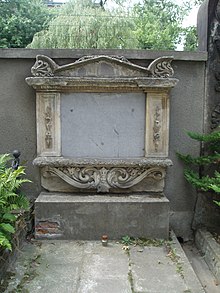Michael Gröll
Michael Gröll (* around 1722 in Nuremberg ; † September 15, 1798 in Warsaw ) was a German-born printer , publisher , bookseller and councilor of the 18th century during the period of the outgoing Polish aristocratic republic . He was president of the German Evangelical Congregation Augsburg Confession in Warsaw.
life and work
As a young journeyman , Gröll moved from his hometown of Nuremberg to Dresden , where he became successful and owned a bookshop as early as 1750 . In the last years of the reign of King August III. In 1759 he sold his Dresden business and settled in Warsaw, where he founded Poland's first advertising paper in Polish, German and French. In 1760 he was allowed to open a bookshop in an outbuilding of the Warsaw Royal Castle . As a bookseller, he introduced book auctions , reviews and catalogs that were previously unknown in Poland . In 1769 Gröll opened the first reading room and the first lending library in Warsaw in addition to the bookshop .
In 1775 Gröll received the royal privilege to open his own printing house . The quality of his publications was at the level of Western European products and far surpassed that of contemporary Polish books. The first text of the constitution of May 3, 1791 and the first Polish encyclopedia by Ignatius Krasicki appeared in his office . In addition to the books, he also published three magazines in Polish, German and French. He promoted Polish literature and tried to make it known in other countries through translations. For his services he was appointed councilor and received the royal medal "Merentibus". During the Kościuszko uprising in 1794, he joined the rebels, founded a new newspaper, " Warschauer Zeitung für Polens Free Citizens ", which was intended to reach the Germans living in the capital and German-speaking countries, and published his own poems there. z. B. " Up! Citizen Hurry! who can argue. Take care of the fatherland! ".
Michael Gröll also tried his powers in the field of literature: as early as 1753 he published the poem " Defense of the weak sex " in Dresden , in 1778 he published an anthology of Polish anacreontics in Warsaw in his own German translation and provided it with the essay " About the shepherd poetry in Germany and about Salomon Gessner ”. In 1790 he was paid homage to a panegyric Polish poem: (Translator): “ Your fame will never pass / As long as Nuremberg and Warsaw stand! ".
Gröll was active on the municipal council of the Evangelical Congregation in Warsaw for decades and was unanimously elected president of the church college in 1778 . He took part in the General Synod of Wengrow with delegates Christian Ebert , Johann Heinrich Peters from the Reformed Congregation and Johann Phillip Barth, Sattler and Johann Samuel Giering . He succeeded u. a. to break the domination of the nobility in the municipal council.
The painter and graphic artist Karl Michael Gröll and three daughters come from his first marriage with Johanna Sophie Schüller († 1776) and his second wife Sophie Karoline Jacobson, daughter of a famous Warsaw goldsmith , enabled him to expand and close his business thanks to her dowry modernize.
The Grölls were buried in the cemetery of the AK Evangelical Congregation in Warsaw (Avenue 2, No. 10).
literature
- History of the Evangelical Church of the Augsburg Confession in Warsaw
- Eugeniusz Szulc: Cmentarz Ewangelicko-Augsburski w Warszawie. Zmarli i i Rodziny . Państwowy Instytut Wydawniczy, Warsaw 1989, ISBN 83-06-01606-8 , ( Biblioteka Syrenki ).
- Marion Voigt: Michael Gröll (1722–1798) as a Polish bookseller and publisher of the Enlightenment . Master's thesis, FAU Erlangen-Nürnberg, 1992
- Dorota Sierocka: "The innovative strength at Michael Gröll's plant". Master's thesis, Adam Mickiewicz University in Poznan, Poland, 1993
Individual evidence
- ^ Polish Biographical Dictionary : * November 11, 1722 in Nuremberg , † September 2, 1798 in Warsaw
| personal data | |
|---|---|
| SURNAME | Gröll, Michael |
| BRIEF DESCRIPTION | German-born printer, publisher, bookseller and councilor |
| DATE OF BIRTH | around 1722 |
| PLACE OF BIRTH | Nuremberg |
| DATE OF DEATH | September 15, 1798 |
| Place of death | Warsaw |
